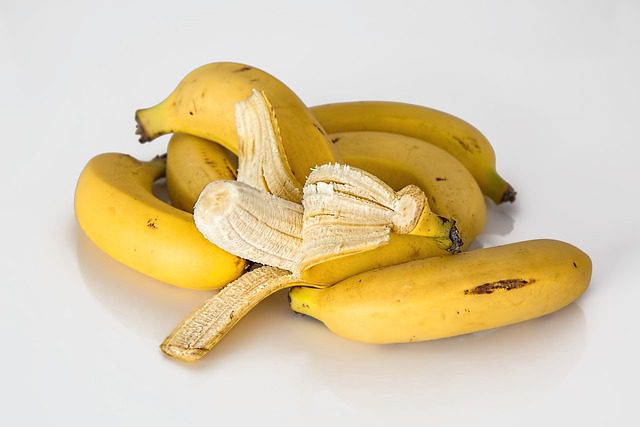Key Takeaway:
Yes, you can compost citrus peels! With a few simple steps—like chopping them up and balancing with browns—citrus peels add nutrients and zest to your compost without harming the pile.
Can You Compost Citrus Peels?
Citrus peels have long been misunderstood in the composting world, often labeled as too acidic, too oily, or too slow to break down.
But the truth is, they’re perfectly compostable and even beneficial when handled properly. This article busts the myths, explores the science behind citrus decomposition, and provides easy, practical tips to compost citrus peels effectively—whether you’re using a backyard bin or an indoor system.
From nutrient value to pest resistance and beyond, citrus brings more to the compost party than you might think.
Introduction
The composting conundrum
The world of composting is usually a happy-go-lucky one—egg shells, coffee grounds, veggie scraps, all thrown into a steaming, decomposing paradise.
But toss in an orange peel and suddenly everyone clutches their pitchforks in suspicion.
Why citrus peels spark controversy
Citrus peels are like the misunderstood villains of the composting universe. Rumors swirl about their acidity, their oiliness, and their alleged worm-murdering tendencies.
But do they deserve the bad rap?
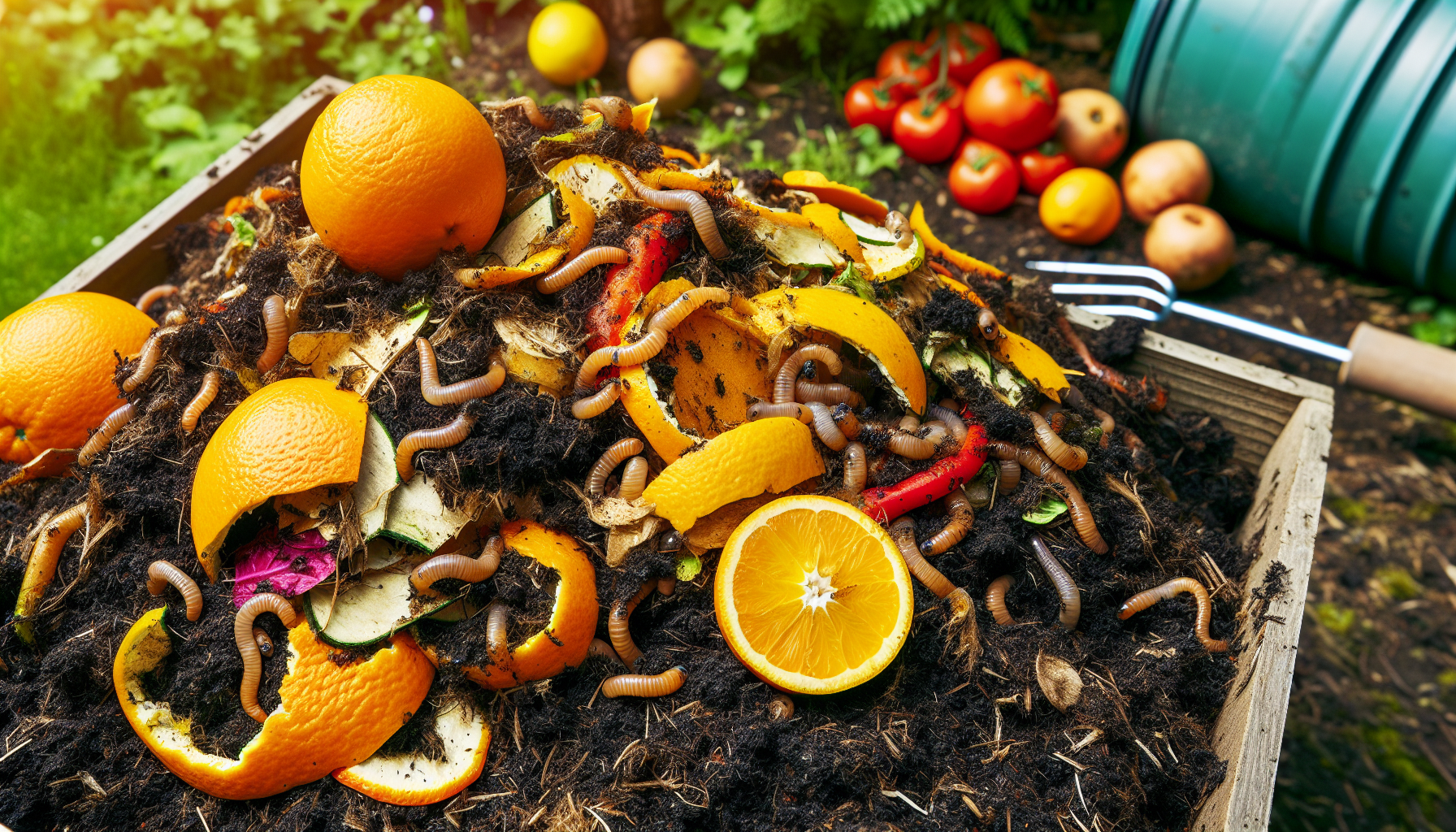
The Anatomy of Citrus Peels
What’s inside the zest and pith
That bright, fragrant rind isn’t just for show. It’s packed with flavonoids, pectin, and aromatic compounds. Underneath the zest is the pith—white, spongy, and loaded with fiber.
Essential oils and their impact on microbes
Citrus oils like limonene have natural antimicrobial properties. That sounds scary for a compost pile, but in practice, it just means they take a bit longer to break down—not that they obliterate all microbial life.
What Makes Citrus Peels Antimicrobial?
Citrus peels—especially from oranges, lemons, and limes—contain essential oils, the most notable being d-limonene. This compound is naturally found in the zesty outer layer (the colorful part of the peel) and is responsible for that signature citrus scent.
But d-limonene isn’t just a pretty fragrance—it’s a powerful natural solvent and antimicrobial agent. It helps protect the fruit from pests, fungi, and bacteria while it’s growing. Basically, it’s citrus’s built-in defense system.
What Do These Antimicrobial Properties Do in Compost?
Here’s the scoop:
- Initial Slowdown: When first added to compost, citrus peels may slightly inhibit microbial activity on their surface due to the oils. That’s why they take a bit longer to break down than, say, a banana peel.
- Not Compost Killers: The oils only affect a small area and for a short time. Compost piles are full of a diverse and robust microbial population. Once the oils start to dissipate (which happens fairly quickly), microbes resume feasting on the peel like it’s a juicy buffet.
- No Long-Term Harm: The amount of essential oils in a few peels is far too low to cause widespread microbial shutdown. In fact, the pile’s natural ecosystem adjusts just fine—especially if the peels are chopped, mixed well, and balanced with carbon-rich material.
Bonus: Mold Still Wins
Even with antimicrobial oils, citrus peels often mold before anything else. That’s because fungi are tough cookies—they can handle the citrus oils and start breaking things down, paving the way for bacteria to follow.
So in short: Yes, citrus peels have antimicrobial compounds, but they won’t ruin your compost. They just need a bit of time and the right conditions to let the microbes get to work.
The Myth of the ‘Compost No’ List
Origins of composting myths
Once upon a time, someone tossed a whole lemon into their compost and it didn’t vanish overnight. That anecdote somehow morphed into the infamous “never compost citrus” rule.
How citrus peels got blacklisted
Blame it on early vermicomposters. Worm bins, being delicate ecosystems, reacted poorly to heaps of citrus. But this cautionary tale spread beyond its context, turning into blanket advice.
Can Citrus Peels Actually Be Composted?
Short answer: Yes
Spoiler alert—they absolutely can. In fact, when composted properly, they’re nutrient-rich and beneficial.
The science behind decomposition
Citrus peels are organic matter. Microorganisms feast on them just like other kitchen scraps. They just demand a bit more patience and surface area.
The Slowpoke Factor
Why citrus peels take their sweet time
With tough skins and waxy coatings, citrus peels are slow to soften. It’s not personal—it’s just structure.
Surface area: the secret composting hack
Chop, shred, pulverize—whatever you do, make those peels smaller. Tiny bits mean more surface area, which means faster decomposition.
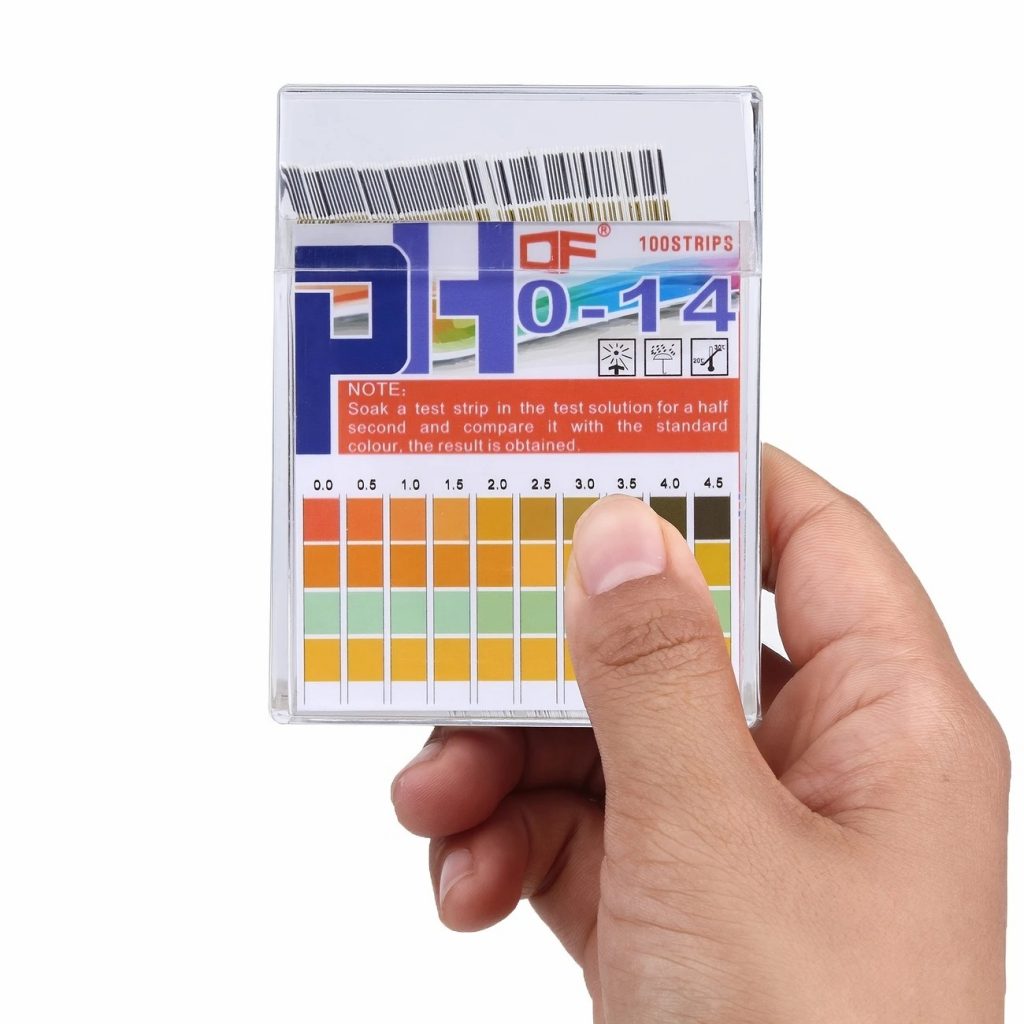
Acidic Nature: Friend or Foe?
pH panic—misunderstood acidity
People often panic about citrus lowering the compost’s pH. But compost piles are champs at self-regulating acidity, especially when well-balanced.
Buffering capacity of compost piles
With enough browns (think leaves, cardboard), the compost acts like a sponge—absorbing and neutralizing any acidity like a Zen master.
Earthworms and Citrus: A Drama in the Worm Bin
Vermicomposting with peels
Worms are a bit citrus-shy. In worm bins, citrus should be introduced gradually, if at all. They’re picky eaters with delicate sensibilities.
Citrus sensitivity and worm behavior
Too much citrus can send worms packing—or worse, they may retreat to a corner and pout (metaphorically). Use sparingly in vermicompost setups.
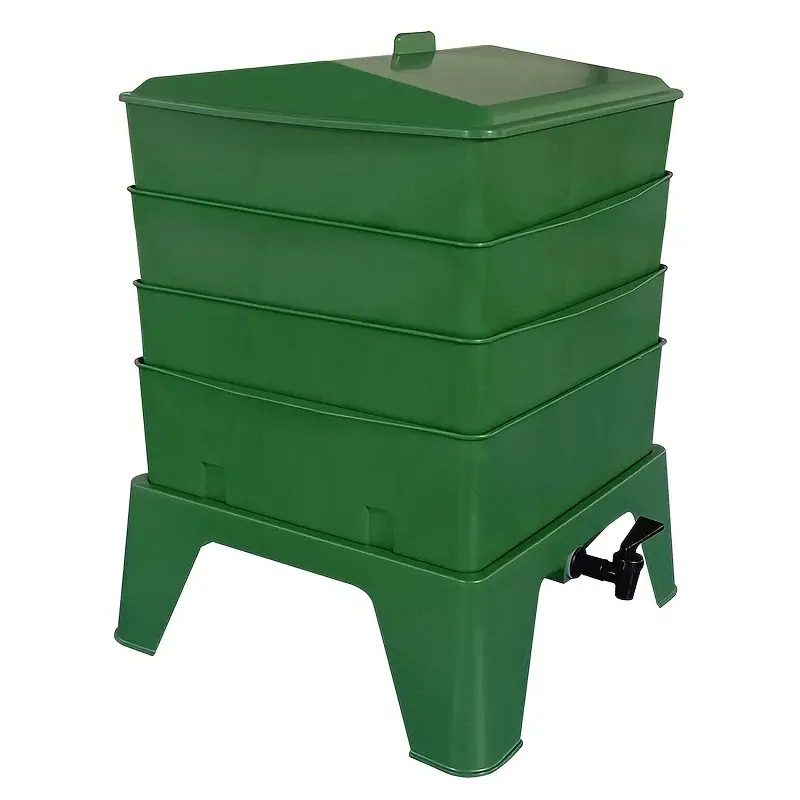
Mold, Mildew, and the Microbial Party
Why mold is actually a good sign
That fuzzy patch on an old orange slice? That’s decomposition in action. Mold is nature’s composting assistant.
The microbial buffet effect
Once citrus breaks down a bit, it becomes prime dining for bacteria, fungi, and other compost critters. The buffet is open.
How to Compost Citrus Peels the Right Way
Chop it like it’s hot
Use a knife or food processor to reduce peels to smithereens. Smaller bits = faster rot.
Mix with browns: the golden ratio
Always mix citrus with plenty of carbon-rich browns. This keeps the pile balanced and prevents sliminess.
Keep your pile aerated and active
Turn the pile regularly. Oxygen is the VIP guest at this microbial dance party.
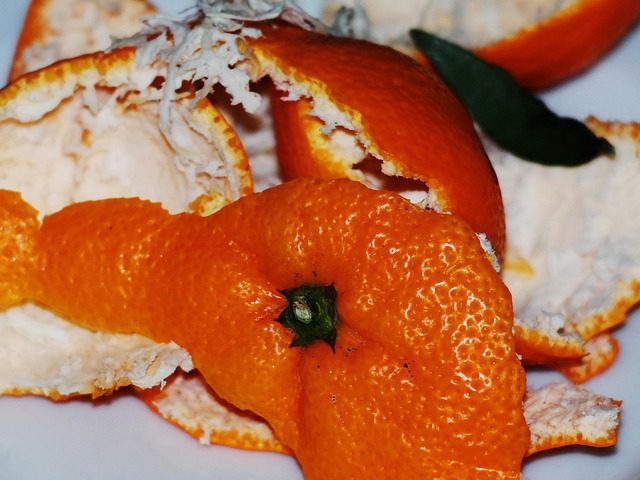
The Dos and Don’ts
Citrus composting checklist
✅ Chop it
✅ Mix it
✅ Cover it
✅ Keep balance
🚫 Dump in large amounts
🚫 Add to worm bins indiscriminately
What to absolutely avoid
Avoid adding citrus peels that are moldy and sprayed with pesticides. It’s the double whammy your compost doesn’t need.
Urban Legends: Will Citrus Kill Your Compost?
Debunking doomsday scenarios
No, citrus won’t turn your pile into a barren wasteland. The microbes aren’t that delicate, trust us.
What actually disrupts compost health
Meat, dairy, too much moisture, and lack of oxygen—those are your real compost villains.
Composting Indoors vs Outdoors
Apartment composters, take note
Indoor composting? Use citrus cautiously. Smaller bits, limited quantities, and plenty of carbon-rich companions.
Outdoor bins and climate considerations
Outdoor compost bins are far more forgiving. A bit of citrus here and there won’t upset the balance.
Citrus as Pest Repellent in Compost
Ants, raccoons, and scent deterrents
Ironically, the strong citrus smell can repel pests. Ants hate it. Raccoons wrinkle their noses. It’s a win-win.
Natural compost guardians
Citrus peels act like tiny bouncers—keeping some intruders away from your precious compost pile.
The Aromatic Aftermath
Fragrant compost piles
Fresh citrus additions can make your compost pile smell delightfully zesty—at least until the microbes take over.
How long the smell sticks around
Give it a week or two. That signature citrus smell fades fast, especially if the pile is hot and active.
Nutritional Value of Citrus in Compost
Nutrient breakdown of peels
Citrus peels contain potassium, calcium, magnesium, and even some phosphorus. All are great for your garden soil.
How citrus enriches the final product
Once broken down, citrus contributes to a mineral-rich compost that helps plants thrive—especially those that love slightly acidic soils.
When Citrus Peels Should Not Be Composted
Pesticide contamination
If your citrus isn’t organic, those peels could carry chemical residues. Not ideal for compost meant for food crops.
Overload scenarios and balance tips
Too much citrus can tip the balance. Think of it like seasoning—just a dash will do.
Alternative Uses Before Composting
Homemade cleaners
Citrus peels + vinegar = DIY citrus cleaner. Smells amazing, works wonders.
Citrus zest bombs for cooking
Don’t waste that zest! Freeze it and use it to add zing to dishes and baked goods.
Citrus Composting Around the World
Global habits and traditions
In tropical regions, citrus peels are composted with ease—heat and humidity work wonders on tough rinds.
Lessons from tropical composters
Frequent turning, balance, and chopped peels. That’s the magic combo.
Fun Experiments With Citrus in Compost
Time-lapse decomposition
Try it: bury one half of a citrus peel and leave the other on top. Track which breaks down first.
Composting competitions: orange vs. banana
Spoiler: banana peels win. But citrus is the long-distance runner—it always catches up.
Conclusion
Let’s peel away the fear
Citrus peels aren’t compost villains. They’re misunderstood heroes with a zest for life—and decay.
Final thoughts for fearless composters
Don’t be afraid to toss in those peels. Chop, mix, balance—and watch your compost thrive.
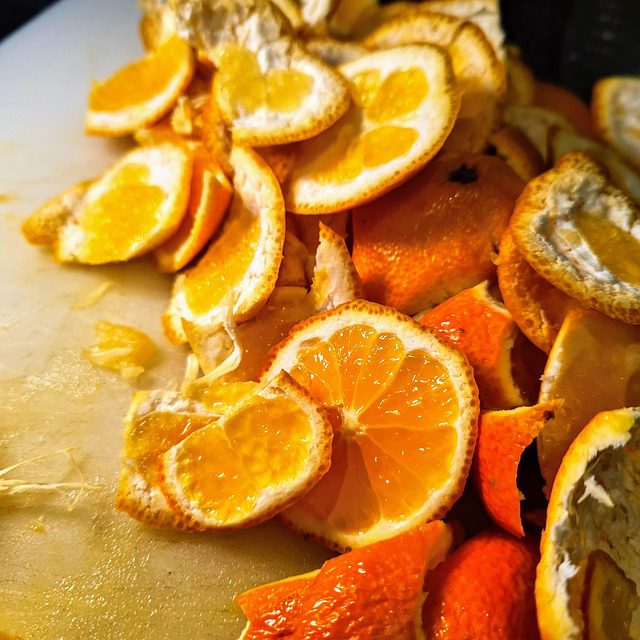
FAQs: Can You Compost Citrus Peels?
1. Can citrus peels be composted?
Yes, citrus peels can be composted. They break down like any other organic matter when properly managed in a compost pile.
2. Are citrus peels too acidic for compost?
While citrus peels are acidic, compost piles have natural buffering abilities that balance pH levels, especially when mixed with carbon-rich materials.
3. Do citrus peels kill beneficial compost microbes?
No. Although citrus contains antimicrobial oils, they don’t kill off compost microbes. They may slow decomposition slightly, but they’re still compost-friendly.
4. Will citrus peels harm worms in vermicomposting bins?
In large amounts, yes. Worms are sensitive to acidic foods like citrus, so peels should be added in moderation or avoided in worm bins.
5. How long do citrus peels take to decompose?
Whole peels can take weeks or months to break down. Chopping or shredding them speeds up the process significantly.
6. Should I chop citrus peels before composting?
Yes. Chopping increases surface area, which accelerates microbial activity and helps citrus break down faster in the compost pile.
7. Can moldy citrus peels go in compost?
Yes! Mold is a natural part of decomposition and won’t harm your compost. Just avoid peels with harmful chemical residues.
8. Do citrus peels attract pests to compost piles?
Not usually. Their strong scent can actually repel some pests, like ants and raccoons, rather than attract them.
9. Are citrus peels good for compost nutrients?
Absolutely. Citrus peels add potassium, magnesium, calcium, and other minerals that enrich the final compost.
10. Can I compost citrus peels indoors?
Yes, but with caution. Use small amounts, chop them finely, and balance with browns to keep your indoor compost fresh and healthy.
Check out our article on on how to Make Compost From Kitchen Waste
Check out our article on Best Composters For Home Use
Check out our article on Can You Compost Banana Peels?
In a (Citrus) Peel: Quick Summary
Yes—you can compost citrus peels! Despite the myths, these zesty scraps aren’t compost villains. They’re just a little tougher and more aromatic than your average kitchen waste.
The trick? Chop them small, mix them well with browns like leaves or cardboard, and keep your pile turned and balanced.
Their natural oils might slow down decomposition a bit, but they won’t harm your compost microbes—or your garden.
Just a heads-up for worm bin users:
worms are citrus-sensitive! Too much citrus can irritate their delicate skin and send them wiggling away in protest. So if you’re vermicomposting, go easy on the oranges and lemons.
In the end, citrus peels are nutrient-rich, pest-resistant, and compost-friendly when used right. They bring zing to your pile and goodness to your soil.
So don’t toss ‘em—compost ‘em!


